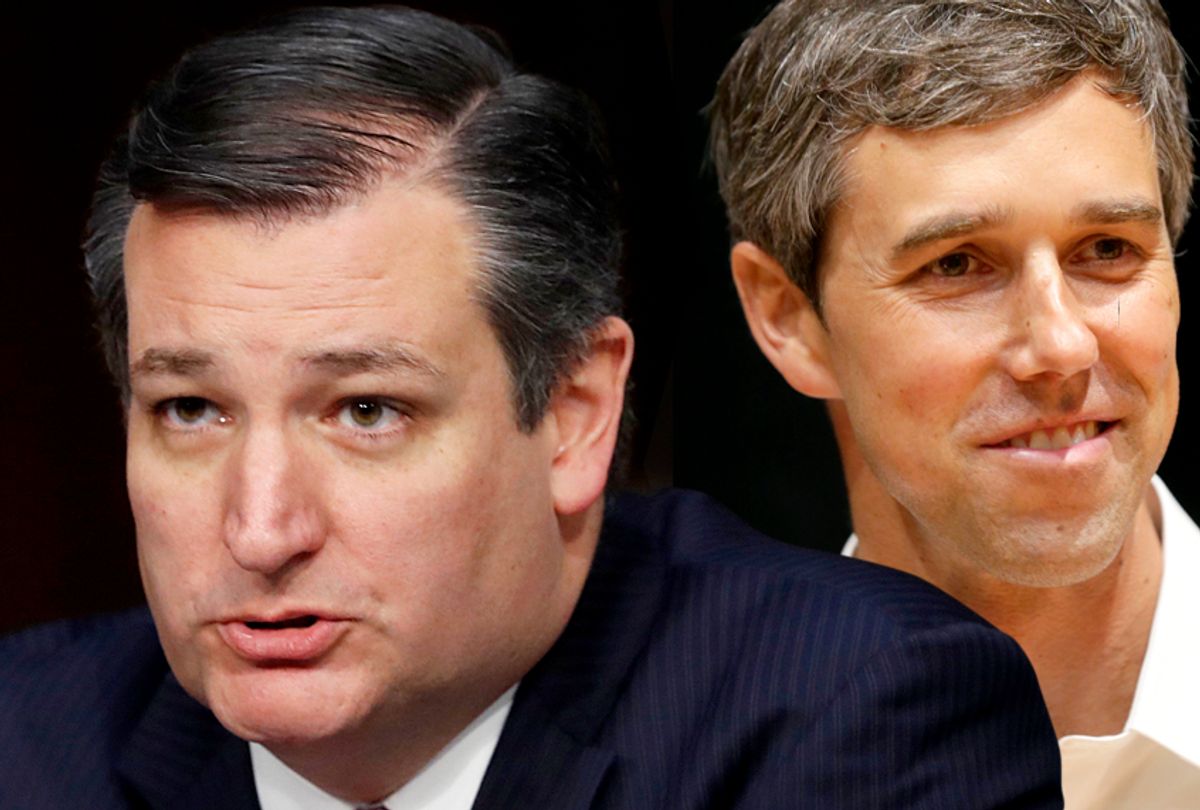A Democrat has not been elected to statewide office in Texas since 1994, but in private and in public, Republican thought leaders have conceded that their opposing party's drought could soon dry up this November.
Indeed, whether Rep. Beto O'Rourke (D-Tex.) will actually beat Sen. Ted Cruz (R-Tex.) in the upcoming senate race is a real probability that notable Republicans are fretting about.
Rick Tyler, a former Cruz campaign strategist, told MSNBC Sunday that "it's possible" that the Republican incumbent could lose his reelection bid, and Republicans in Texas and elsewhere cannot afford to think that their two-decade stronghold in statewide office is untouchable.
"Beto O'Rourke has consistently out fundraised him [Cruz] – and I think 2-1 – and he doesn't take PAC money," Tyler added. "It should be a 10- or 15-point race. It’s not. It’s a zero to 4-point race, and Beto O’Rourke is running an interesting campaign. And he’s grabbed national attention, so it’s a race."
Tyler's comments came after Mick Mulvaney, the federal budget director for President Donald Trump's administration, also questioned Cruz's ability to pull out a win this fall, calling into question the incumbent senator's likability without actually mentioning him by name.
"There’s a very real possibility we will win a race for Senate in Florida and lose a race in Texas for Senate, OK?" Mulvaney told Republicans gathered in a closed door meeting Saturday, according to audio of the event obtained by the New York Times. "I don’t think it’s likely, but it’s a possibility. How likable is a candidate? That still counts."
"I don’t worry about what some political guy in Washington says," Cruz later said in response. "I worry about what the people of Texas say."
As Tyler referenced, Texans are speaking, and recent polls have Cruz up by just a slight margin: +4.4 percentage points, according to the current Real Clear Politics average. The most recent poll in the aggregate, from Emerson College, shows Cruz ahead by just one percentage point, well within the margin of error.
Cruz's vulnerability seems to be the product of both the strength of his opponent and the "blue wave" that ensued following Trump's election. For his part, Mulvaney has categorized the Democrats as encouraging a "movement of hate," and questioned what the party's message was beyond being anti-Trump. "What is the signature piece of legislation they’re against? The tax bill?" he asked in the Republican meeting.
READ MORE: The Year of the Woman in electoral politics? Maybe so — but not for Republicans
The Republicans have also raised almost twice as much as the Democrats for the midterms – a disparity that the Republican National Committee hopes will make the difference. "It does cost, right now, more money to engage our voters, to get them knowledge of the election," Ronna McDaniel, the Republican National Committee chairwoman, said in the meeting with Mulvaney. "They have their energy. We have our infrastructure."
But casting the potential "blue wave" as simply anti-Trump could prove to be a gross underestimate of the policies, ideas and communities Democrats are engaging and supporting.
O'Rourke, who hails from El Paso, has run a lively campaign with a uplifting message. He has visited all 254 of Texas' counties rather than just targeting major or urban cities in which Democrats tend to do well. He supports marijuana legalization, criminal justice reform and an eventual single-payer health care system. Significantly, O'Rourke has also provided a hopeful message about Texas' border cities – one that contrasts sharply with Trump's.
"Kids like me had internalized what the rest of the country thought about us," O’Rourke told HuffPost. "That we weren’t supposed to amount to much, that we were just a dusty border town." That portrayal could not be less accurate, O'Rourke continued, adding that the communities that line the U.S.-Mexico border are "a place for the ambitious," for those who want to "take a chance and bet everything on bigness and on greatness."
For O'Rourke to ultimately unseat Cruz, an uphill battle remains, but like New York's Alexandria Ocasio-Cortez, the key is mobilizing turnout. "This is a mobilization election – not a persuasion election," James Henson, the director of the Texas Politics Project at the University of Texas, told HuffPost. "Each candidate has to mobilize its partisan base. Neither candidate has much of a chance of changing each other’s voters’ minds, because of the gulf between the two candidates."



Shares